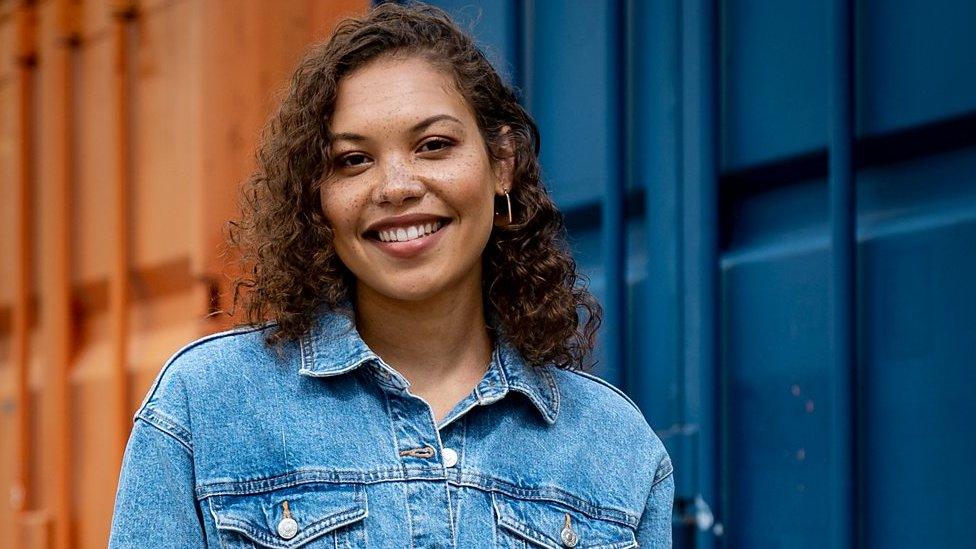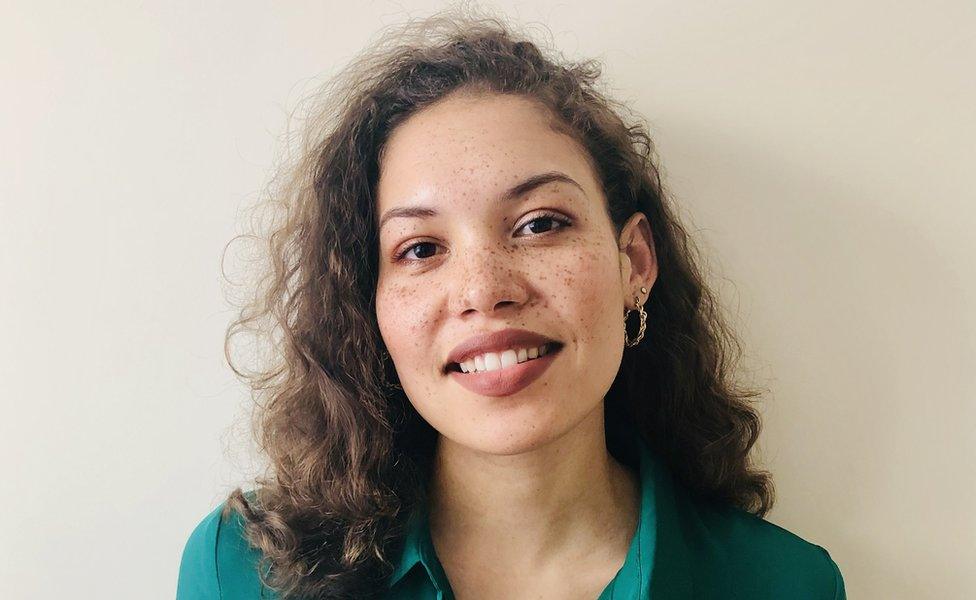Festival President's speech: Seren Jones
- Cyhoeddwyd

Seren Jones - one of Gŵyl AmGen's Festival Presidents
Gŵyl AmGen's Festival President on Saturday is Seren Jones - reporter, presenter and producer with the BBC's News Podcast Unit in London.
Gŵyl AmGen will celebrate the best of Welsh culture on Radio Cymru and Cymru Fyw between 30 July and 2 August. The digital festival is in partnership with the National Eisteddfod, which has been postponed this year due to the coronavirus crisis.

'...according to society I've never 'looked' Welsh'
May was the most difficult month of my career so far. It's the month when George Floyd was killed by Derek Chauvin, a member of the Minneapolis Police Department in America.
Another black man who lost his life to the hands of those in authority - a situation that isn't new or uncommon, especially in the United States. What is new about this particular case is the fact that the whole incident was recorded and put online. The entire eight minutes and 46 seconds, during which George Floyd said 'I can't breathe' more than 20 times. It became a video that went viral for all of the wrong reasons.
The death of George Floyd re-energised the Black Lives Matter movement, which led to protests across the world and led to lengthy and uncomfortable discussions between friends and family members about racism, inequality and identity.
Over the past two months, I've had endless conversations about the subject - too many even, which is inevitable in a way. For some reason, there's a misconception that it's the black community's responsibility to explain why the events surrounding George Floyd's murder were so dreadful and so wrong. So like many people in the community - and as someone who works in the media - I've found this period psychologically draining and extremely emotional.
But despite this, I have found myself writing a speech and facilitating a conversation for Gŵyl AmGen on BBC Radio Cymru and BBC Cymru Fyw; the first BBC festival of its kind, discussing race in Wales through the medium of Welsh. And that's the main reason I decided to get involved.
We don't talk about inequality and racism within the Welsh-speaking community, despite both factors being very much alive and well. The murder of George Floyd wasn't just about a man being killed because of the colour of his skin, it symbolised a voice that is ignored, and a life that is less important - something too many of us in Wales can unfortunately relate to.
Wales is not only my home, but it is home to thousands of other people from black, Asian and minority ethnic backgrounds.
'You're Seren Jones?! And you speak Welsh?'
From what I understand, according to society, I have never 'looked' Welsh. And I have noticed, no matter how Welsh your name is, if you don't look how your name implies, your Welshness is questioned.
This is the pattern that was played on repeat from my childhood and into my twenties. Years ago, when I was in secondary school, I decided to put my name into Facebook's search engine. I don't remember why, but I remember wanting to know what it would be like for someone else to look for me on the social media platform.
It took less than a second for Facebook to complete its task, and I was presented with dozens of Seren Joneses across the country. One after another, I saw faces from Carmarthen, Amman Valley, Newport and Anglesey. Pretty faces, happy faces, confident faces. Some were teenage girls, others were women and mothers. But the one thing they all had in common was the colour of their skin.
I hadn't quite realised how Welsh my name is: Seren Jones. To me it was just another familiar Welsh name, like Lowri, Angharad and Catrin. I wasn't aware that for some people, Seren Jones usually looked like a certain person of a certain colour, and I started to question how many people associated the name Seren Jones with the girls I had stared at whilst scrolling through Facebook.
Consequently, people's reaction to my name once they saw my face didn't come as a surprise to me. And as if this wasn't enough of a shock to them, the reaction I'd receive when I'd also say I that I speak Welsh was even more unbelievable.
'You're the Welsh language trainee?!'
This was the response I got on my first day of training at the BBC in Birmingham, four years ago.
'Yes,' I said. 'I'm Seren Jones.'
'You're Seren Jones?! And you speak Welsh?' said the man holding the register of new journalists.
So on my first day in my new job, I found myself in a situation where someone was having trouble understanding my existence. Although the man's reaction was innocent, and unfortunately common, it appeared he struggled to believe that people like me - who aren't white - could also speak Welsh. So in a way, like many others, he didn't know that we exist. The realisation set in that I belong to a percentage of the country's population who is not considered Welsh because of the colour of our skin.

I could question why this assumption is so normal, but I think many of us in Wales know part of the answer.
'...for some there is still a select nature of belonging to the Welsh-speaking community.'
According to the last census in 2011, 94% of people in Wales declared themselves as white, which means only 6% of people in Wales come from a black, Asian or minority ethnic background. In terms of Welsh speakers, there are fewer than 900,000 living in Wales. But the percentage of BAME Welsh speakers isn't yet available, and that speaks volumes.
Although Wales is becoming more multicultural and diverse every year, for some there is still a select nature of belonging to the Welsh-speaking community, which is felt by many on the outside. The Welsh-speaking community is a proud and fierce one that has successfully battled to keep its language and culture alive for generations. It's no surprise then that they'd protect their identity at all costs.
Clearly, the fight has been paying off. Not only is the Welsh language alive but it's growing. With the government's aim of reaching a million Welsh speakers by 2050, more people are learning the language now than ever before.
But although the Welsh language is moving forward, I wonder if our attitude towards our changing population moving in the same direction? Do we need to question people's Welshness who have different accents, different backgrounds and different experiences? Or compare the Welshness of someone who isn't white but speaks Welsh with someone who is white but can't speak the language? Do we need to stay in the past when the future can look so hopeful?
Once we dismantle this hierarchy of Welshness, change will begin, at home.

